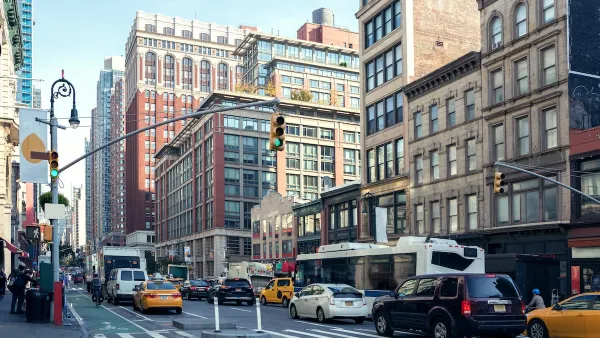In this Q&A, urban planning professor Mitchell Moss explains how budget crises at the federal, state and local levels will affect transit funding in New York City and other places.
Moss looks at a future of uncertain funding, but also new ideas for creating sustainable funding sources for transportation.
"The Shoshin Project: What does this environment mean for transportation policy?
Mitchell Moss: Transportation in New York is vital to our economic strength. We are able to bring hundreds of thousands of people in per day by commuter rail, by subway, by bus. In other words, we have an extremely sophisticated mass transit system. That system is dependent upon the fare box, upon revenues from the city and from the state, and one of the great challenges is to maintain that system in good repair. And that's very expensive. I think we have to appreciate that declining revenues from real estate transactions have severely hurt the MTA.
That means three things. We're seeing cutbacks in service, we've seen increases in fares, and we're seeing the need to find new sources of capital, whether that's tolls or different revenue streams, or that can be through private financing. But we're going to have to be more creative in gaining either revenue or productivity out of either the workforce or out of new technologies."
FULL STORY: Mitchell Moss: We've Got To Get Creative On Transit Funding

Maui's Vacation Rental Debate Turns Ugly
Verbal attacks, misinformation campaigns and fistfights plague a high-stakes debate to convert thousands of vacation rentals into long-term housing.

Planetizen Federal Action Tracker
A weekly monitor of how Trump’s orders and actions are impacting planners and planning in America.

In Urban Planning, AI Prompting Could be the New Design Thinking
Creativity has long been key to great urban design. What if we see AI as our new creative partner?

Florida Seniors Face Rising Homelessness Risk
High housing costs are pushing more seniors, many of them on a fixed income, into homelessness.

Massachusetts Budget Helps Close MBTA Budget Gap
The budget signed by Gov. Maura Healey includes $470 million in MBTA funding for the next fiscal year.

Milwaukee Launches Vision Zero Plan
Seven years after the city signed its Complete Streets Policy, the city is doubling down on its efforts to eliminate traffic deaths.
Urban Design for Planners 1: Software Tools
This six-course series explores essential urban design concepts using open source software and equips planners with the tools they need to participate fully in the urban design process.
Planning for Universal Design
Learn the tools for implementing Universal Design in planning regulations.
Gallatin County Department of Planning & Community Development
Heyer Gruel & Associates PA
JM Goldson LLC
City of Camden Redevelopment Agency
City of Astoria
Transportation Research & Education Center (TREC) at Portland State University
Jefferson Parish Government
Camden Redevelopment Agency
City of Claremont





























